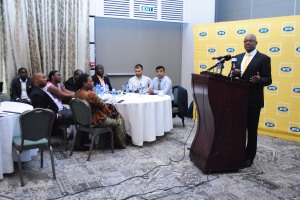
The National Communications Authority (NCA) says when the interconnect clearinghouse (ICH) takes off later this year it will facilitate the transfer of money across mobile wallets on the various telecom networks in the country.
At least three telcos, MTN, Airtel, and Tigo offer mobile money services in the country. But because of lack or interoperability, they are unable to link their respective platforms to ensure transfer of money from a wallet on one network to a wallet on another.
So far telcos are only able to transfer money between wallets on their respective networks, and or to generate tokens that can be sent via SMS to another network for a cash out. Indeed Tigo cash is also able to purchase airtime for a subscriber on another network. But transfers from wallet to wallet on different networks is still not possible yet.
As a result of that limitation among others, mobile money usage in the country is not growing as fast as mobile telecom service usage. Overall mobile telecom subscriptions in the country is now more then 30 million but total mobile money customers is hovering around five to six million.
Telecom analyst Fouad Chilabi, called on financial institutions to collaborate with telcos in the country to make mobile money transfers across networks possible, as panacea to boosting mobile money usage.
But an NCA official, in an exclusive message to your authoritative Simcardblog noted that the ICH will remove that limitation, because it will become a common platform for telcos to link to the Ghana Interbank Payment and Settlements System (GhIPSS) switches, to which all banks in the country are already connected.
He said “GhIPSS will do all the net credit and debits from the advice of reconciliation from the ICH on all mobile money transactions across networks.”
The NCA official said ICH would facilitate interoperability in many respects and linking telcos mobile money platforms to make across-network wallet to wallet transfer possible is just one of them.
Currently, mobile money licenses are issued by the Bank of Ghana to banks and they collaborate with telcos to establish mobile money platforms. This is because the bottom line is movement of money and banks are the only institutions authorized to hold cash in this country.
Indeed, in the Bank of Ghana roadmap towards a cashless/cash-lite society, the mobile money outfits of the various telcos are to be registered separately as financial institutions and be run as such.
When that happens, the mobile money license will go directly to the mobile money outfits of the telcos and they will be able to hold cash and move it between their customers both on and off net.
Pundit have however asked whether the mobile money outfits of the telcos would still need ICH to connect to GhIPSS after they have received their banking licenses.
But the NCA official insisted that so long as mobile money involves a mobile phone transaction, the ICH will capture it and send reconciliation to GhIPSS for settlements with banks “whether pure banks or telco banks.”
“You can carry out a mobile transaction without being captured by ICH,” he said.
Meanwhile, the Head of IT at GhIPSS, Kojo Ntim believes GhIPSS itself is a a single point of failure so he and his team micro manage the system 24/7 to ensure continuous service to its customers.
He expressed the hope that the ICH for the telecoms industry would also be monitored closely to ensure continuous efficiency at all times, as, like GhIPSS, a failure at the ICH could lead to grave consequences for many institutions within the ecosystem.
